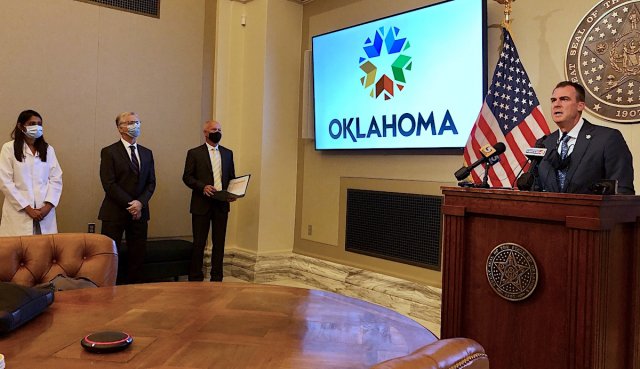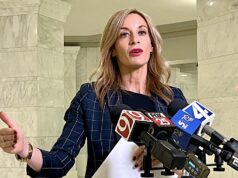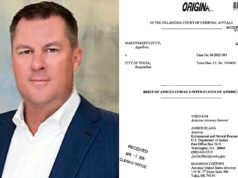Oklahoma Gov. Kevin Stitt and health leaders said this morning that treatment options for COVID-19 are improving and hospital capacity remains acceptable, but the White House Coronavirus Task Force recommendation of a statewide Oklahoma mask mandate will not be followed.
“We’ve issued guidance saying that we believe everyone should wear a mask and follow guidelines from the CDC,” Commissioner of Health Lance Frye said. “We have not issued a statewide mask mandate. That would require an executive action from the governor, but the governor and I both believe that local communities need to make those decisions.”
Stitt addressed the latest White House Task Force report from Sept. 13, which lists as its first recommendation: “Establish a statewide mask mandate.” The report did not say that specifically in its previous two iterations.
“We make decisions based on the facts and the data here in Oklahoma and not what we see on television, not what the feds tell us we have to do,” Stitt said. “Those reports are a lot of times just cut and paste and sent around to all 50 states.”
Stitt said task force member Dr. Deborah Birx told him last month that “she agrees that the decisions should be made locally.”
“We’ve had some counties that have had zero cases in the last seven days,” Stitt said. “I’ve been very clear from the beginning that I believe a mask mandate is unenforceable, and I’m not going to mandate something that I don’t think you can enforce. (…) Making someone in western Oklahoma that has zero cases (wear a mask) I just think is not practical.”
Stitt did, however, praise local authorities like those in Oklahoma City, Tulsa and Norman that have implemented mask mandates.
“Some of the local communities have decided to do that,” he said. “We applaud that and we think that is a local decision.”
‘Hard work of our medical professionals is really paying off’
Also during Thursday’s press conference, Frye, Stitt and a pair of state doctors told Oklahomans that there is good news: Treatments for COVID-19 are improving and hospital capacity remains roughly where it was in late March.
“Oklahomans can feel confident that the treatments for COVID-19 are improving,” Stitt said. “We can also feel confident that hospitalizations are on the decline. And the hard work of our medical professionals is really paying off.”
An antiviral drug called remdesivir has shown positive results for COVID-19 patients.
“Remdesivir actually got its emergency use authorization in about April 2020,” said Dr. Mousumi Som, chief of staff for the OSU Medical Center.
She added that typical recovery periods for treatment without the drug have averaged 15 days, but those treated with remdesivir have averaged about 11 days.
Dr. Doug Drevets, chief of infectious diseases at the OU Health Sciences Center, said an anti-inflammatory drug called dexamethasone has been used to aid treatment as well.
“We look forward to continuous improvement as we go forward,” he said.
But Frye warned that Oklahomans need to remain vigilant about COVID-19, especially as flu season approaches.
Stitt encouraged what he calls the “three W’s”: wash your hands, watch your distance, wear a mask when we are around others.
And Frye had a message specifically for an age group seeing high positive test rates: college students.
“College students: Please practice social distancing, wear a mask, wash your hands, and if you start to feel ill, please stay where you are,” Frye said. “Don’t spread it to our most vulnerable populations.”
The Hill publishes state emails about Trump rally
On Wednesday, Washington-based publication The Hill published a series of emails obtained from former Oklahoma state epidemiologist Aaron Wendelboe in the days leading up to President Donald Trump’s controversial June campaign rally in Tulsa.
“I am concerned that the mass indoor gathering in Tulsa of 19,000 people will directly lead to deaths in Oklahoma,” Wendelboe wrote in one email. “As the state epidemiologist, I feel I have a responsibility to speak out and warn of the estimated risk.”
The Hill reported that the email’s title was: “How strongly do I speak out?”
Wendelboe resigned his position in July.
Stitt said Thursday that his administration and health leaders considered a lot of perspectives regarding the Trump rally and other COVID-19 decisions.
“We look at tons of different data. If you remember, epidemiologists, I had some predicting we’d have 5,000 people in the hospital on April 1,” Stitt said. “We had some predicting 30,000 deaths.”





















